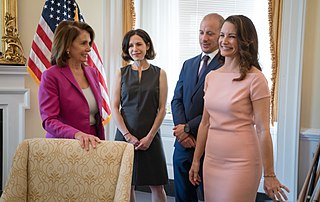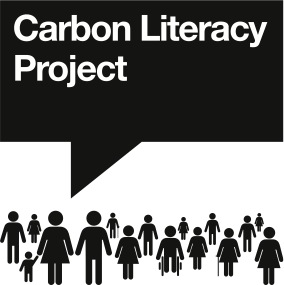
A community is a social unit with a shared socially-significant characteristic, such as place, set of norms, culture, religion, values, customs, or identity. Communities may share a sense of place situated in a given geographical area or in virtual space through communication platforms. Durable good relations that extend beyond immediate genealogical ties also define a sense of community, important to people's identity, practice, and roles in social institutions such as family, home, work, government, TV network, society, or humanity at large. Although communities are usually small relative to personal social ties, "community" may also refer to large-group affiliations such as national communities, international communities, and virtual communities.
A nonprofit organization (NPO), also known as a nonbusiness entity, nonprofit institution, or simply a nonprofit, is a non-governmental (private) legal entity organized and operated for a collective, public or social benefit, as opposed to an entity that operates as a business aiming to generate a profit for its owners. A nonprofit organization is subject to the non-distribution constraint: any revenues that exceed expenses must be committed to the organization's purpose, not taken by private parties. Depending on the local laws, charities are regularly organized as non-profits. A host of organizations may be nonprofit, including some political organizations, schools, hospitals, business associations, churches, foundations, social clubs, and consumer cooperatives. Nonprofit entities may seek approval from governments to be tax-exempt, and some may also qualify to receive tax-deductible contributions, but an entity may incorporate as a nonprofit entity without having tax-exempt status.
A Jewish Community Center or a Jewish Community Centre (JCC) is a general recreational, social, and fraternal organization serving the Jewish community in a number of cities. JCCs promote Jewish culture and heritage through holiday celebrations, Israel-related programming, and other Jewish education. However, they are open to everyone in the community.

Public finance refers to the monetary resources available to governments and also to the study of finance within government and role of the government in the economy. Within academic settings, public finance is a widely studied subject in many branches of political science, political economy and public economics. Research assesses the government revenue and government expenditure of the public authorities and the adjustment of one or the other to achieve desirable effects and avoid undesirable ones. The purview of public finance is considered to be threefold, consisting of governmental effects on:
- The efficient allocation of available resources;
- The distribution of income among citizens; and
- The stability of the economy.

Goodwill ambassador is a post-nominal honorific title, a professional occupation and/or authoritative designation that is assigned to a person who advocates for a specific cause or global issue on the basis of their notability such as a public figure, advocate or an authoritative expert. Sometimes the role of a goodwill ambassador is presented as "Ambassador" or "Goodwill Ambassador" preceding the first and last name, the titled name of the individual is always presented with an organizational, regional or national affiliation. Goodwill ambassadors generally deliver goodwill by promoting ideals or positions from one entity to another, or to a population to establish a benevolent relationship. A goodwill ambassador may be an individual from one country who resides in or travels to another country on a diplomatic mission at a peer to peer level. This can be country to country, state to state, city to city, or as an intermediate emissary representative of the people of a specific organization or cultural group, such as an indigenous tribe, marginalized people or enclave population.

Fundraising or fund-raising is the process of seeking and gathering voluntary financial contributions by engaging individuals, businesses, charitable foundations, or governmental agencies. Although fundraising typically refers to efforts to gather money for non-profit organizations, it is sometimes used to refer to the identification and solicitation of investors or other sources of capital for for-profit enterprises.

A charitable organization or charity is an organization whose primary objectives are philanthropy and social well-being.

Communal work is a gathering for mutually accomplishing a task or for communal fundraising. Communal work provided manual labour to others, especially for major projects such as barn raising, "bees" of various kinds, log rolling, and subbotniks. Different words have been used to describe such gatherings.
A social enterprise is an organization that applies commercial strategies to maximize improvements in financial, social and environmental well-being. This may include maximizing social impact alongside profits for co-owners.

A community interest company is a form of social enterprise in the United Kingdom intended "for people wishing to establish businesses which trade with a social purpose..., or to carry on other activities for the benefit of the community".
Laws regulating nonprofit organizations, nonprofit corporations, non-governmental organizations, and voluntary associations vary in different jurisdictions. They all play a critical role in addressing social, economic, and environmental issues. These organizations operate under specific legal frameworks that are regulated by the respective jurisdictions in which they operate. Such law can facilitate the workings of nonprofit organizations, but they can also hamper their functioning.
The following outline is provided as an overview of topics relating to community.

Charity is the voluntary provision of assistance to those in need. It serves as a humanitarian act, and is unmotivated by self-interest. Various philosophies about charity exist, with frequent associations with religion.
Ren Ci Hospital is one of the first few charity healthcare institutions in Singapore to provide affordable healthcare and rehabilitative services in Singapore. Established in 1994, Ren Ci Hospital currently has three facilities Ren Ci Community Hospital, Ren Ci @ Ang Mo Kio and Ren Ci @ Bukit Batok St. 52. Besides government subvention, Ren Ci Hospital also relies heavily on public support and donation.

The Edlavitch Jewish Community Center of Washington, D.C. is an American Jewish Community Center located in the historic district of Dupont Circle. It serves the Washington, D.C. area through religious, cultural, educational, social, and sport center programs open to the public, although many programs are strongly linked to Jewish culture, both in the United States and in Israel. It is part of the JCC Association (JCCA), the umbrella organization for the Jewish Community Center movement, which includes more than 350 JCCs, YM-YWHAs, and camp sites in the U.S. and Canada, in addition to 180 local JCCs in the Former Soviet Union, 70 in Latin America, 50 in Europe, and close to 500 smaller centers in Israel.
The Big Society was a sociopolitical concept of the first 15 years of the 21st century, developed by the populist Steve Hilton, that sought to integrate free market economics with a conservative paternalist conception of the social contract that was influenced by the 1990s civic conservatism of David Willetts. The Big Society influenced the 2010 UK Conservative Party general election manifesto and the legislative programme of the Conservative–Liberal Democrat coalition agreement. The relevant policy areas were devolved in Northern Ireland, in Scotland and in Wales, to, respectively, the Northern Ireland Executive, the Scottish Government and the Welsh Government.

Healthy Planet Foundation was an environmental charity in the United Kingdom formed in 2007 by Shaylesh Patel, on the ethos that small changes together will build sustainable, healthy communities leaving a positive legacy for future generations. Healthy Planet championed grassroots and green causes that promoted healthy living.

Carbon Literacy is the awareness of climate change and the climate impacts of humankind's everyday actions. The term has been used in a range of contexts in scientific literature and in casual usage, but is most associated with The Carbon Literacy Project (CLP).

Tweeza, also Touiza or Tiwizi, is the term used in north Africa to designate the cooperation in a Sufi and cultural heritage in which a group from the tariqa or zawiya in a community or village gathers and cooperates in order to contribute to the achievement of charitable work, help the needy or the poor, build a house for a person or a mosque, clean a cemetery, village, or mosque, or harvest wheat fields and olive trees.














